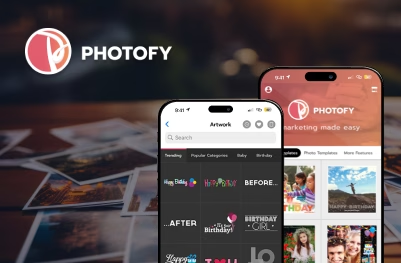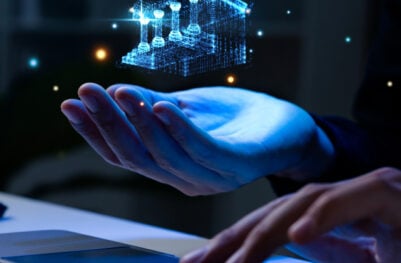- Developers
- Developer Blog
- Blockchain Development
- How Blockchain Can Redefine the Gaming Industry?
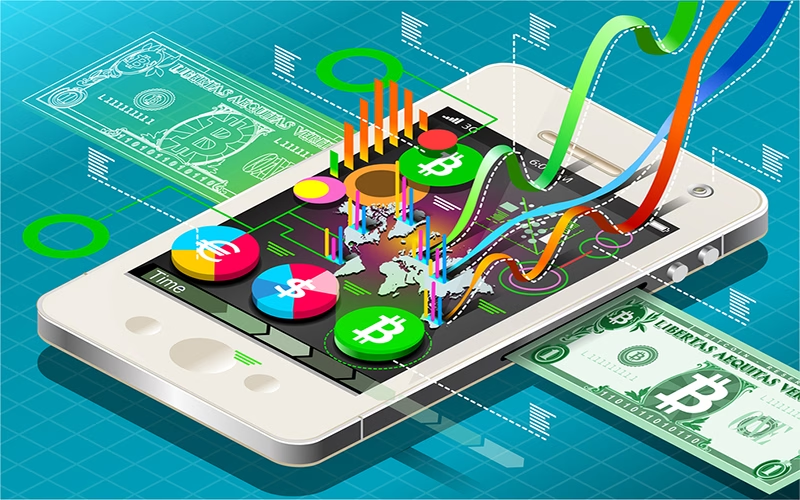
profile

By Aran Davies
Verified Expert
9 years of experience
Aran Davies is a full-stack software development engineer and tech writer with experience in Web and Mobile technologies. He is a tech nomad and has seen it all.
Interested in knowing how blockchain can improve the gaming industry? Read our article where we provide many examples of how you can leverage blockchain in gaming.
Blockchain gaming is an excellent market with many opportunities to be explored. Let’s start with some statistics and latest trends.
- According to Fortune Business Insights, the global blockchain gaming market was valued at $128.62 billion in 2022 and is expected to grow to $614.91 billion by 2030.
- The global blockchain gaming market size will grow at a CAGR of 70.3% from 2022 to 2027.
In this article
- How Blockchain Gaming Can Help?
- Cryptocurrencies Can Make In-Game Purchases Easier
- Blockchain Provides a Safe and Secure Environment for Game Developers and Entrepreneurs
- Blockchain in Gaming Helps in Securely Buying and Selling In-Game Assets
- Blockchain in Gaming Enables Interoperable Profiles of Players
- Blockchain Gaming Enables the Projection of Value on Intangible Assets
- Blockchain Will Let Players Securely Store In-Game Assets
- Blockchain Gaming Allows Players to Truly Own Their In-Game Assets
- Blockchain Allows Players Greater Control over Their Favorite Games
- Blockchain Gaming Opens New Territory for Developers
- Blockchain Allows Players to Collaborate with Developers to Improve a Game
- Blockchain Enables the Creation of Rarer In-Game Assets
- Blockchain Prevents Fraud
- Frequently Asked Questions on Blockchain Gaming
How Blockchain Gaming Can Help?
First, let’s look at some of the main characteristics of the gaming industry.
Characteristics of the gaming industry
There are specific characteristics of gaming platforms and dynamics of the gaming industry, besides, stakeholders also have specific tasks. These make it a rapidly growing segment of the global technology sector. They also make it a prime candidate for disruption! These are the following:
- You need money to play popular games. While some of these games allow a player to accumulate digital gold, that‘s too inconvenient for most players because it takes time. Most players spend their fiat money to buy in-game assets.
- Game entrepreneurs and developers need a safe and secure environment to develop and launch games and subsequently, monetize them.
- Players need to securely buy and sell in-game currency; hence, they need safe platforms for that.
- Players may play many games, and they create their profiles there. They would like the profiles to be interoperable across games, and this is another area where technology can help.
- The trend of people projecting value on intangible assets is real, so we will see more and more real money spent on virtual games. When a sector enters this phase, it’s ripe for technological disruption.
- When they are not playing an online game, the players would need to store their virtual game assets securely. Currently, these assets are stored in the centralized server of the gaming company, making them an easy target for hackers. This is another area where technology can make a big impact.
- Do you play online games? Then you have experienced this. You never really own any of the in-game assets; rather, the gaming company owns them. This presents another opportunity for disruption.
- Did you ever feel disheartened that your favorite online game shut down? Or did you feel that the rules were changed suddenly and arbitrarily? Technology that can give greater control to players will disrupt the current gaming market.
- Have you ever felt that you have the talent to make a game even more interesting, but you can‘t do so because the gaming company won‘t employ you? A technology that opens the field for talented developers will be a game-changer.
- As a player, did you ever feel that you could make a game far more exhilarating if you could collaborate with the developer? If technology can spawn a business model enabling closer collaboration between players and developers, it will change the industry forever.
- Did you ever feel that if the gaming company allows the creation of rarer forms of in-game assets, then the game would be a lot more fun to play? Technology could help here.
- Players often face fraudulent transactions in virtual game platforms, which is another aspect where technology can make a difference.
Read more about these characteristics, dynamics, and asks in “The Evolution of Blockchain Games and a Peek at What‘s to Come.”
Read on to find out how blockchain can positively impact each of the above areas.
Cryptocurrencies Can Make In-Game Purchases Easier
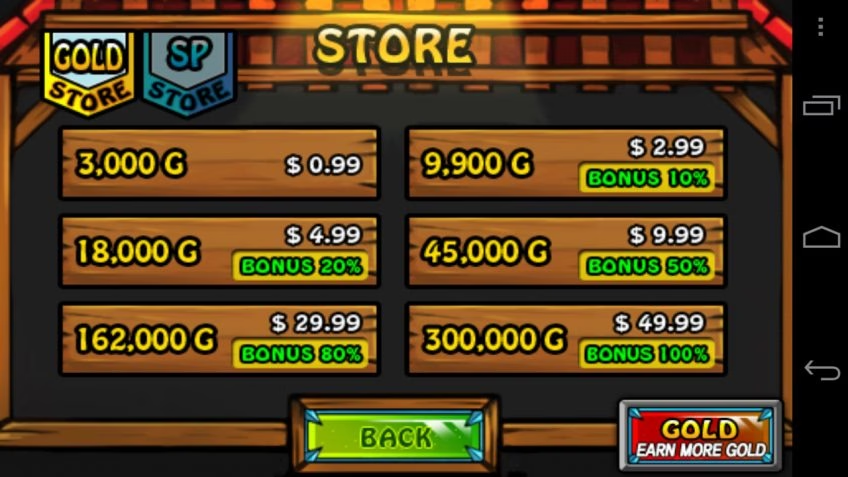
If you are a game developer, you can help players by enabling them to make in-platform payments and purchase assets in cryptocurrencies. Players will not need to wait for 3rd party payment providers to process their fiat currency transactions. Instead, they can buy game collectibles instantaneously.
You are also enabling players to save on the fees that the payment providers charge. Read more about it in “Real World Applications of Cryptocurrencies — Video Game Virtual Goods.”
Blockchain startups are already noticing this opportunity. For e.g. Enjin has introduced a framework for game developers that includes the following:
- Software development kits (SDKs);
- Wallets;
- Game plugins;
- Other apps for virtual item management and payment gateway.
They are also bringing blockchain technology to the video game industry. They have an ERC20 token, ENJIN Coin, which will support transactions on their platform. Visit the Enjin Coin website to learn more about them.

Get a complimentary discovery call and a free ballpark estimate for your project
Trusted by 100x of startups and companies like
Blockchain Provides a Safe and Secure Environment for Game Developers and Entrepreneurs
Blockchain platforms use highly powerful data encryption technologies like the private key-public key to secure crypto token transactions. With the computing technology we have today, it’s impossible to hack these data encryption techniques. Read more about it in “Explaining the Crypto in Cryptocurrency.”
That apart, hackers won’t be able to destroy a decentralized blockchain network since there is no one server to destroy. Nodes maintain the distributed databases in a shared manner, and each node has complete information in the database.
Hackers can’t delete or modify an existing network’s transaction history in the blockchain, and it’s impossible to stage a ’Distributed Denial of Service’ (DDoS) attack against these networks. Blockchain networks use ’Proof of Work’ (POW) or other consensus algorithms that keep the network secure.
Read more about the POW algorithm in “Proof of Work vs Proof of Stake Comparison”.
As a game entrepreneur or developer, you have a secure environment when you develop your game on the blockchain.
Blockchain in Gaming Helps in Securely Buying and Selling In-Game Assets

With an enormous interest in cryptocurrencies, buying and selling crypto tokens securely is now easy. If you develop your game on blockchain and allow players to buy and sell in-game assets using digital currencies, they have enough secured means to do those transactions.
For e.g., MyEtherWallet is a good web wallet for players. They can also keep their digital currencies safe when they aren‘t using them with hardware wallets like Ledger Nano S.
If players secure their private keys, their transactions are safe. However, they need to maintain a disciplined approach to their computer security, e.g. take regular back-ups, avoid risky websites, and avoid keeping too many cryptocurrencies in web or mobile wallets.
Read more about crypto wallets in “How To Develop A Bitcoin Wallet App.”
Blockchain in Gaming Enables Interoperable Profiles of Players
Crypto traders and investors have the public address that they can use for transactions across different blockchain networks. If you create your games on the blockchain, your players can take their unique public addresses from one game to the other.
They can transact with their cryptocurrencies from the same public address across those different games. Read more on how blockchain for gaming can enable this interoperability, in “How Blockchain Is Changing The Rules Of The Game”.
Blockchain Gaming Enables the Projection of Value on Intangible Assets
Vancouver, British Columbia, Canada-based Axiom Zen launched CryptoKitties on November 28th, 2017. By December 6th, players had already spent $ 6.7 million on this game.
This shows that if you build an interesting enough game on the blockchain, players won’t shy away from projecting real value on intangible digital collectibles. The key is a game that’s fun to play.
Build a really fun game, and blockchain, with its’ instantaneous disintermediated cryptocurrency transactions, will enable players to spend. Read more about how CryptoKitties went viral in “How to Build a DApp Game App Like CryptoKitties?”.
Blockchain Will Let Players Securely Store In-Game Assets
Hackers love centralized servers! It’s just one stationary target for them, and if they can break the encryption, all assets stored on the server are theirs.
Blockchain technology in the gaming industry can change that. When players buy digital collectibles in your blockchain-based game, they can store them securely in their crypto wallets.
For e.g., visit the Enjin Coin website once again and scroll down. You will notice that they have an Enjin wallet for players to store Bitcoin and Ether, and they can secure their in-game items, too. This is one of several benefits of blockchain in online gaming.
Blockchain Gaming Allows Players to Truly Own Their In-Game Assets
Unlike the current scenario where you really don‘t own your in-game purchases, a benefit of blockchain in gaming is that players own their assets. A blockchain-based game will use smart contracts to govern transactions inside the game, and that makes the difference.
Hire expert developers for your next project
1,200 top developers
us since 2016
Smart contracts are executed automatically upon fulfillment of conditions coded in them, and the result is irreversible. When you launch a blockchain-powered game, all in-game assets that your players bought using smart contracts are transferred to their public addresses. Smart contracts also allow for full transparency and every player can view the rules.
Smart contract execution results are recorded in a decentralized blockchain, and those records are immutable. No centralized agent can change the public address where the assets are stored; hence, no one can change the ownership of the in-game assets.
Read about the irreversible execution of smart contracts in “How to Deploy Smart Contracts on Ethereum?”.
Blockchain Allows Players Greater Control over Their Favorite Games
A game like CryptoKitties is a ’Decentralized App‘ (DApp). If you are a gaming entrepreneur or developer, you will likely take the DApp route to launch your blockchain-based game.
DApps have certain characteristics that set them apart from other apps, as follows:
- While the front-end code can be in any language, a DApp must have smart contracts as its‘ backend code.
- A DApp must run on a decentralized blockchain.
- A DApp must use crypto tokens created using a standard cryptographic algorithm, and no one entity can own a majority of those tokens.
- It must store its‘ data in a decentralized blockchain, following cryptographic standards.
- The code must be open-source.
- Most importantly, a DApp must run autonomously, and the user community must reach a consensus to modify a DApp.
Read more about DApps in “How to Build a Decentralized Application (DApps)”.
You can‘t shut down your blockchain DApp game unilaterally or change it without a consensus of the players’ community. These give players much better control over the game and its future. No more heartbreak for them due to the abrupt shutdown of their favorite game!
Blockchain Gaming Opens New Territory for Developers
Assume you are a talented developer with a great idea for a killer game app, but you have no experience in the gaming industry. Centralized gaming companies operate in a highly competitive environment and experience is of premium value for them. You will likely wait a while before you land that job in a gaming company to develop that killer game of yours.
You can learn to develop a DApp game. There are excellent resources. For e.g., the Loom Network has built an interactive course for developing your own DApp game. Check out their CryptoZombies coding school.
I mentioned Enjin earlier, but they aren’t the only blockchain start-ups to provide SDKs for developing a blockchain-based game. Loom Network provides its Unity SDK, and you can use that to build your game. Check out the GitHub material for Unity SDK to get started.
You can also build your blockchain game from scratch as follows:
- Learn Ethereum development, including coding smart contracts and DApp development.
- Create your Ethereum account.
- Install the tools you need.
- Code your smart contracts.
- Test, deploy, and run smart contracts you coded.
Blockchain-based games are open-source, and you can view the code of similar games if you need guidance. For e.g., if you are building something like CryptoKitties, you can check out their smart contracts in their EthFiddle repository.
The open-source code also allows you to fork and start with a base code; hence, you may not have to start from scratch.
FYI, other popular blockchain games include:
- Pixels
- Splinterlands
- Boomland
- Axie Infinity
- My Crypto Heros
Blockchain Allows Players to Collaborate with Developers to Improve a Game
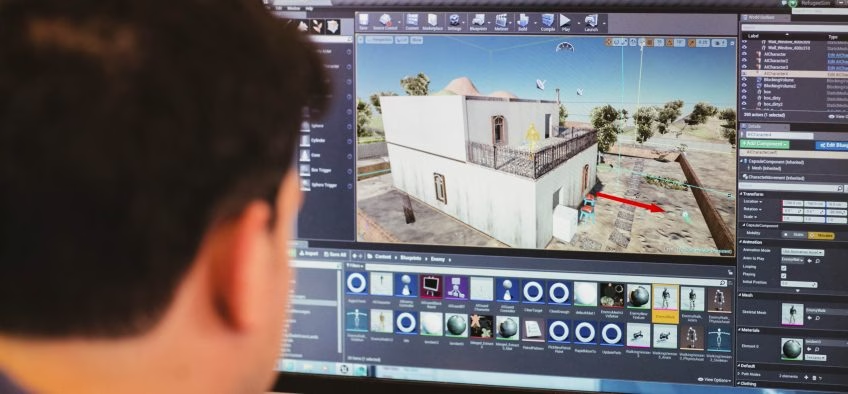
Blockchain is changing the game industry by enabling open communication between players and developers. This is possible because developments in blockchain apps are driven by a community consensus and not top-down.
A player or another developer can come up with a great idea to enhance a game. If the community agrees, the enhancements will be made.
I will explain these dynamics of the blockchain ecosystem with a non-gaming example, namely, the ’Segregated Witness‘ (SegWit) implementation in Bitcoin. No one owns Bitcoin centrally. When Bitcoin faced scalability issues due to the POW consensus algorithm, Peter Wiulle, a developer, presented the SegWit idea. It was implemented after the Bitcoin community agreed, resulting in lower Bitcoin transaction fees.
SegWit was a deeply technical idea, hence it needed a developer to formulate What is SegWit?.
Hire expert developers for your next project
Blockchain Enables the Creation of Rarer In-Game Assets
An already visible gaming industry trend that will become more pronounced in the future is that rarer digital collectibles will attract greater prices. This drives up the revenue of the sector.
Blockchain smart contracts can be a great way to create “IF-THEN-ELSE” conditions that will produce rarer in-game assets based on certain types of interaction. For e.g., CryptoKitties smart contracts produce rarer breeds of kittens in some cases, and they attract a higher price.
Read a review of CryptoKitties smart contracts in “How to Code Your Own CryptoKitties-Style Game on Ethereum”.
Blockchain Prevents Fraud
I had earlier explained how modern cryptography and consensus algorithms protect blockchain networks from hackers. Smart contracts running on top of a blockchain network can be vulnerable if they have bugs. It’s possible for hackers to exploit such bugs; an example was the Ethereum DAO hack in 2016.
In the case of the Ethereum DAO hack, malicious agents exploited a loophole in the ’Decentralized Autonomous Organization’ (DAO) smart contract. They were about to make off with ETH 3.6 million ($ 70 million at that time). However, the transparency of blockchain prevented it.
A public blockchain allows everyone to read all transactions, and the Ethereum community soon discovered the hack. They implemented a hard fork to prevent the drainage of funds and refunded the money to DAO investors.
If you are developing a game on the blockchain, make sure you code your smart contracts well. However, a completely open ledger of all transactions helps in preventing fraud, and that’s another support blockchain provides you with.
Planning to Invest in Blockchain Gaming Industry?
The global gaming sector is massive; the virtual world’s global revenue reached $143 billion in 2020, and the gaming industry is accepting blockchain games. Read more about this projection in “How Blockchain Is Changing The Rules Of The Game.”
Gaming and blockchain are natural partners. If you are planning to build that next viral game, consider the advantages of blockchain technologies for game distribution, along with other advantages.
If you are on the lookout for skilled blockchain developers to develop your blockchain game successfully, DevTeam.Space can help you. We have a community of experienced blockchain developers who have built a number of market-competitive blockchain solutions.
Leave your initial blockchain game development specification via this quick form and one of our technical managers will get in touch with you to discuss further details.
DevTeam.Space is an innovative American software development company with over 99% project success rate. DevTeam.Space builds reliable and scalable custom software applications, mobile apps, websites, blockchain game software projects, live-streaming software applications, speech recognition systems, ChatGPT and AI-powered solutions, and IoT solutions and conducts complex software integrations for various industries, including finance, hospitality, healthcare, music, entertainment, gaming, e-commerce, banking, construction, and education software solutions on time and budget.
DevTeam.Space supports its clients with business analysts and dedicated tech account managers who monitor tech innovations and new developments and help our clients design, architect, and develop applications that will be relevant and easily upgradeable in the years to come.
Frequently Asked Questions on Blockchain Gaming
Blockchain is an exciting database technology that allows for decentralized storage and control. There are both public and private blockchains but the underlying principles remain the same. Numerous nodes make up a decentralized network where changes cannot be made without the consent of 51% or more of the nodes. No one entity controls the blockchain.
Blockchain is incredibly useful in the gaming industry. Crypto games can potentially be used to secure the data in existing processes, including writing the winners and losers or the names of people who bet on games into an immutable ledger. Alternatively, it can be used to create decentralized gaming systems where no one company can control the gaming system. Read this article to learn more.
Mobox is one of the NFT-based play-to-earn game platforms. It allows players and investors to freely access and play NFT games (using non-fungible tokens) and earn money.

Alexey Semeney
Founder of DevTeam.Space
Hire Alexey and His Team To Build a Great Product
Alexey is the founder of DevTeam.Space. He is award nominee among TOP 26 mentors of FI's 'Global Startup Mentor Awards'.
Alexey is Expert Startup Review Panel member and advices the oldest angel investment group in Silicon Valley on products investment deals.
